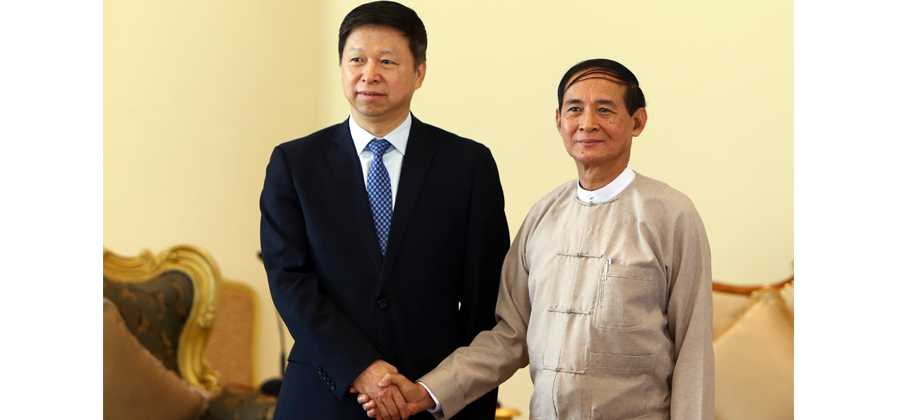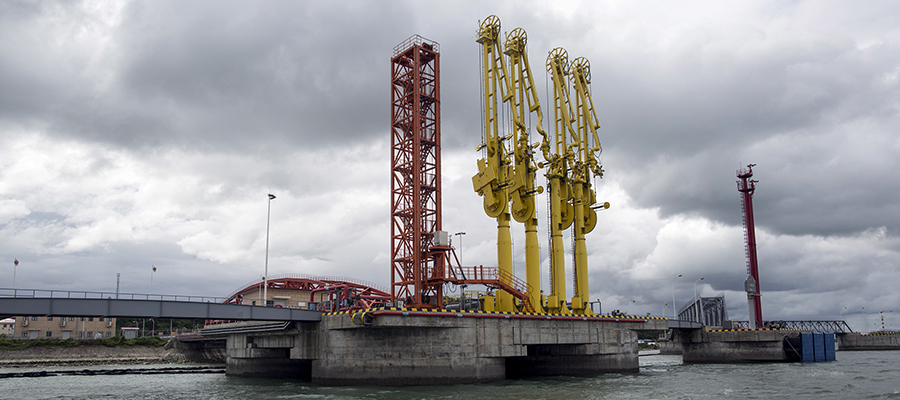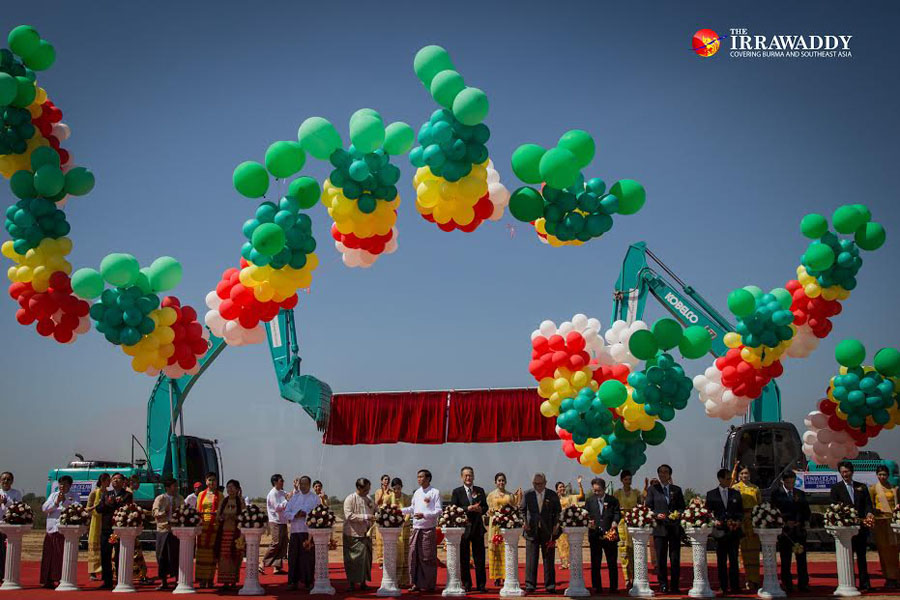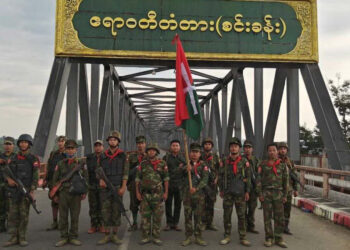YANGON—While the Japanese foreign minister and State Counselor Daw Aung San Suu Kyi discussed Rakhine’s development in Naypyitaw last week, a Chinese Communist Party provincial secretary met the vice president to discuss increasing investment in agriculture, transport and technology cooperation.
It is not the first time China and Japan have been seen directly competing on Myanmar’s economic battlefield.
China and Japan both follow Asian strategies that involve securing supplies of cheap labor, agricultural commodities, and access to ideally situated ports and other strategic locations in Southeast Asia. Myanmar is strategically located in the heart of Asia with China to the north and east, India to the west and ASEAN to the east and south. It has a wealth of unexplored natural resources and its coastlines offer access to the Indian Ocean. For these reasons, it satisfies Beijing and Tokyo’s requirements.
After Parliament elected U Win Myint president in March, China dispatched its minister for the International Department of the Communist Party of China to Naypyitaw. The minister became the first high-ranking foreign official to meet the new president.

From high-ranking ministers to the secretary of the Jilin provincial communist party committee, a special envoy to the peace process and economic development officials, Chinese officials have visited Naypyitaw at least 18 times to engage the government in different sectors this year.
Japanese Foreign Minister Taro Kono’s recent visit focused on development in Rakhine State. He has visited Myanmar twice this year. Other senior Japanese officials have also visited Naypyitaw to discuss financial development and parliamentary engagement.
In February, the Union of Myanmar Federation of Chambers of Commerce and Industry (UMFCCI) and the Japan Chamber of Commerce and Industry Myanmar (JCCM) signed their first-ever MoU to increase trade and investment flows between the two countries.
Beijing has shown a desire to increase engagement with Myanmar, given its strategic position within Chinese President Xi Jinping’s ambitious USD1 trillion Belt and Road Initiative (BRI) to establish a vast global trading network.
Furthermore, while Myanmar faces renewed isolation from the West due to the human rights crisis in western Rakhine State, China has refrained from criticizing Naypyitaw over the issue and blocked a UN Security Council statement about Myanmar’s human rights situation.
Apart from major investment in crude oil and gas pipelines, deep seaports and natural resources, China has offered its support by calling for cease-fire agreements, collaborating on the repatriation of refugees from Bangladesh to Myanmar and supporting improved economic conditions in Rakhine.
Japan is involved in working out solutions for the development of the Rohingya community and has promised to help by joining hands with Myanmar. During the Kono’s trip, Japan reiterated its support for improving Yangon’s rail system and electrification and transportation improvements in Rakhine.
Despite the humanitarian crisis, the country is still viewed as the next frontier for investment opportunities. China and Japan pursue these via development deals in Myanmar; in reality both countries try to match each other in terms of securing infrastructure projects and investment opportunities in Asia and this country has become reminiscent of a Cold War battlefield for them.
China is less popular among Myanmar’s people. Its image was badly damaged due to its aggressive exploitation of opportunities under the previous military regime, which involved exploiting natural resources, human rights abuses and land grabbing for projects across the country. While Beijing has tried hard to engage with local people, it is struggling to restore its good name.
An in-depth survey released by the International Growth Center in August said Myanmar people have a more favorable impression of investment projects by Japanese firms than Chinese firms. Japanese projects are regarded far more positively than their Chinese counterparts as they are seen as having fewer negative impacts on local populations.
The survey found that people prefer Japan to China even though firms from both countries have a record of collaborating with military-affiliated local companies and do not directly engage with local communities in their operations.
Myanmar people prefer Japanese investment because it is focused on technological support, job opportunities and loans for small and medium enterprises that contribute to economic development. It has provided assistance building financial markets and technical support for the Central Bank, and helped to develop railways and the health care system.

Many critics have pushed to have Beijing turn over the controversial Kyauk Phyu Special Economic Zone (SEZ) project to Japan during the shareholder renegotiation process, raising concerns over unethical investments and China’s history of abusing natural resources across the country under the military dictatorship.
Under the shareholder agreement for the Kyauk Phyu project in Rakhine State, made under then-President Thein Sein, China was to hold an 85 percent stake in the project, and the Myanmar government would hold 15 percent.
But Beijing has made progress in renegotiating the deal with the new chairman of the Kyauk Phyu SEZ, offering assurances that it will not lead to an excessive debt burden on the Myanmar government. Kyauk Phyu is a key strategic project under the BRI, as it will boost development in China’s land-locked Yunnan province and provide China with direct access to the Indian Ocean. It would also allow China’s oil imports to bypass the Strait of Malacca.
China and Myanmar agreed on a 15-point MoU for the China-Myanmar Economic Corridor and hope to sign an official agreement this year. The corridor will run from China’s Yunnan Province to Mandalay in central Myanmar, and then east to Yangon and west to the Kyauk Phyu SEZ.
Under the MoU, the governments agree to collaborate on many sectors including basic infrastructure, construction, manufacturing, agriculture, transport, finance, human resources development, telecommunications, research and technology.
According to longtime Myanmar observer Bertil Lintner, “Myanmar’s latest agreements with China will no doubt lead to renewed dependence on Beijing and Japan is eager to counter that.”
“But it remains to be seen how much Japan is willing to invest in Myanmar, and how that investment will really counter China’s expanding power in Myanmar and the region,” he said.
For Myanmar, economic, geographical and political ties with its most powerful authoritarian neighbor, China, are unavoidable. But experts say Japan offers one avenue for balancing out China’s influence.
The chairman of the Smart Group of Companies, U Kyaw Kyaw Hlaing said, “We have to learn how to stay safe with the elephant in the room. However, we also need to find a way to balance the power [of China] if we don’t have the capacity to resist it.”
The U.S. Overseas Private Investment Corporation has warned that Xi’s BRI is burdening poor nations with unsustainable debt through large-scale infrastructure projects.
Washington-based BRI monitor RWR Advisory Group reported that since 2013, 32 percent (roughly USD419 billion) worth of projects related to the scheme face “trouble” in terms of debt sustainability, public opposition, performance delays and national security controversies.
In its diplomacy, Japan prefers to move at a slow pace, exercising caution. Throughout Myanmar’s military-ruled era, it maintained neutral relations with the country.
When Myanmar began opening its economy in 2010, Japan moved actively to boost development in the country, especially of its railway, road and energy networks.
In 2015, Japanese investment flowed into the financial, development and manufacturing sectors.
In June 2013, the Japan International Cooperation Agency made agreements to extend USD485 million in new ODA loans, including a USD190 million infrastructure investment in the Thilawa SEZ, a 2,342-hectare industrial area outside of Yangon.

The SEZ is the first Japan-Myanmar public-private initiative. Japanese firms are interested in investing in the energy sector. One example is a private clean coal project that has started in Myeik.
In addition, Japanese firms are working with Myanmar partners. Daiwa Securities and Japan Exchange Group have invested in the Yangon Stock Exchange, and Mitsubishi and Jalux are involved in renovating and operating Mandalay’s airport. In the real estate sector, Mitsubishi is working with Hong Kong, Singapore and Myanmar partners to develop The Landmark Development in downtown Yangon.
Moreover, Japan provided Myanmar with USD1 billion in loans in 2015, USD7.7 billon in aid and loans in 2016 and USD824 million in loans in 2017.
Japanese investment peaked in 2017 at USD1.48 billion, after reaching USD252 million in 2012, USD55 million in 2013, USD1.02 billion in 2014, USD590 million in 2015 and USD280 million in 2016.
However, Japan lags behind China in terms of capital investment as it adheres to its own standards, principles of law enforcement and legal frameworks, experts said.
“China’s Myanmar policy is very assertive, almost aggressive, while Japan, as usual, is more cautious,” Bertil said.
China has a geographical advantage over Japan. Some experts say China only comes to extract natural resources, whereas Japan mostly focuses on the services sector, the benefits of which will take a long time to materialize.
Japan seems to be waiting to evaluate the return on its investment in the Thilawa SEZ before investing in new projects in Myanmar, experts said.
Myo Min, CEO of the PS Business School said, “Japan goes step by step. They don’t take shortcuts. They also follow laws and regulations. They wait for the implementation of the relevant laws before investing.”
“So, they normally arrive later than China. If they keep hesitating to invest here, China will cause Japan’s economic influence in Myanmar to wane,” U Myo Min said.
As of July 30, China was the largest investor in Myanmar, while Japan was ranked No. 10.
“It is time to accelerate Japanese investment in Myanmar to counterbalance China’s power in the country,” U Myo Min said.
“Otherwise, China will maintain the upper hand in the country, and all the economic reform will be for China’s benefit,” he said.
















